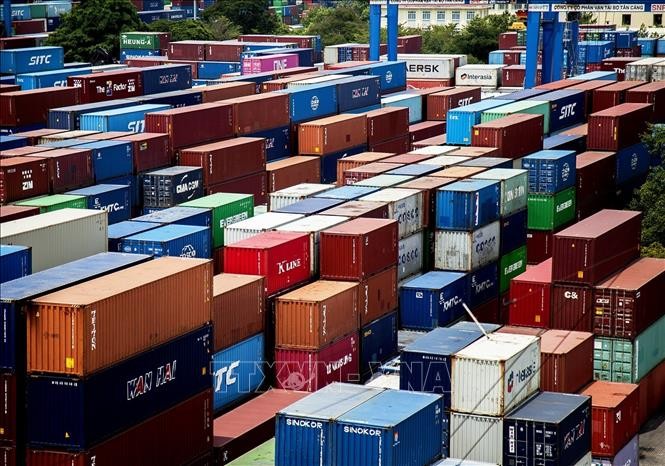 |
| Containers in Cat Lat Port, HCM City (Photo: VNA) |
Vietnam becomes an important production and trade hub in the world, along with a boom of e-commerce and rapid growth of global supply chains.
Deputy Minister of Industry and Trade Phan Thi Thang said the industry plays a crucial role in helping Vietnam's economy overcome difficulties during the COVID-19 pandemic, as well as current global geopolitical fluctuations.
It has contributed to the continuous growth of Vietnam's total import- export turnover, surpassing 600 billion USD in 2021, 700 billion USD in 2022, and reaching 683 billion USD in 2023. The figure hit over 369.6 billion USD in the first six months of 2024, up 16% year-on-year. The national strategy on green growth for the 2021-2030 period with a vision to 2050 has set a target of "greening" economic sectors, boosting the restructuring of the economy in close association with the reform of the growth model. To realise the strategy, the Prime Minister has issued a national action plan on green growth in the 2021-230, in which logistic services are one of the 18 key themes. A logistics business has pointed out that a key factor in accelerating the industry’s growth is technology and collaboration within the symbiotic ecosystem.
According to the World Bank's report, Vietnam's Logistics Performance Index (LPI) reached 3.3 points in 2023, up from 3.27 points in 2018, ranking the country 43 out of the 154 countries worldwide and fifth among ASEAN countries. This is the highest score Vietnam has achieved since the inception of this study.
Vietnam is also among the top 10 emerging logistics markets, ranking 4th in terms of international logistics opportunities, and is considered one of the leading potential growth countries in Southeast Asia. Its growth target of 6.0% for 2024 has boosted confidence among logistics companies.
Particularly, the Government's strong push for public investment, especially in transport infrastructure such as the North-South Expressway, Long Thanh Airport, and high-speed rails also creats positive signs for the potential development of infrastructure serving the logistics industry.
According to Vietnam Report's research findings combined with the synthesis of experts' opinions, domestic maritime transport will go hand in hand with the development of the road network, and this is one of the trends shaping the logistics market in 2024 and next years.
Experts said that a key prerequisite for developing domestic maritime transport is connecting seaports with inland port systems, highways, and railways.
In the short term, logistics firms expect to simplify operational processes to reduce costs; train and improve the quality of human resources; expand the supply chain and explore new markets; strengthen after-sales activities to build customer loyalty; and increase investment in technology equipment to support digital transformation.
Dao Trong Khoa, Chairman of the Vietnam Logistics Business Association (VLA), said green logistics is not just a trend but has become a mandatory requirement and an important criterion for the logistics community to expand international markets and join global supply chains.
Issues related to digital transformation in customs, sustainable air logistics, and training green skill for the workforce will be crucial factors contributing to the green and sustainable development of Vietnam's logistics industry, Khoa stressed.
Vietnam's logistics service companies need to ensure an increase in both quantity and quality, especially in meeting requirements to participate in global supply chains, he went on./.




















































